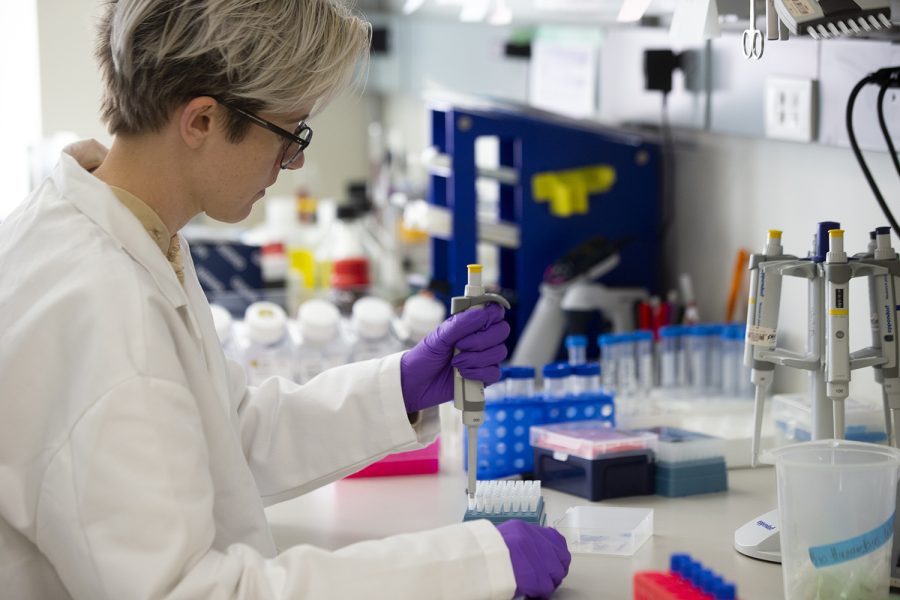UI researchers help discover 60 new genes linked to autism
UI researchers contributed to a study that used DNA from 43,000 autistic individuals and their families to discover 60 genes that are commonly inherited by people with autism. The study was led by researchers at Columbia University, and the UI team worked to recruit people to the study and analyze data from other institutions.
Taylor Thomas, a UI graduate student, works in a lab as apart of the research, led by SPARK and Columbia University that discovered 60 new genes related to autism.
October 5, 2022
University of Iowa researchers recently contributed to a study published on Aug. 18, in Nature Genetics that discovered 60 new genes associated with the autism spectrum.
Of the genes identified in the study, five have never previously been associated with neurodevelopment.
The study was led by researchers at the University of Columbia and involved researchers from over 30 universities, including the University of Iowa.
RELATED: UI researchers to investigate a potential cancer cluster in Hudson School Community District
Jake Michaelson, a UI associate professor across multiple departments, including psychiatry, biomedical engineering, communication sciences and disorders, and neuroscience, was the primary investigator for the UI in this study.
Michaelson and his team contributed to the study by recruiting patients to SPARK, Simons Powering Autism Research, a research group that works to advance the understanding of genetics in relation to autism. His team also provided analysis of the data collected by other institutions.
“We’re one of the few groups that both recruits people, but also analyzes the data because most other groups just do the recruitment,” Michaelson said.
The study was an opportunity for UI doctorate students like Taylor Thomas to be involved. Thomas, who is pursing a doctorate degree in genetics, worked on Michealson’s team.
Doctorate students at the university were also involved in the study. Taylor Thomas, a UI doctorate student in genetics, worked on Michaelson’s team.
“[Michaelson] is in the SPARK working group, and I am also part of that, because SPARK is a nationwide site. There’s also a collaborative group of people across several universities that work on the analyses and are part of that group,” she said.
Thomas said she is excited to be a part of this study because it will help researchers understand the similarities and differences in autism cases.
“No two people with autism are the same, so people have different difficulties and strengths, and genetics can help parse apart all those differences that people with autism have,” she said. “Genetic research was important because it was looking at a different type of genetic variation.”
The study used genetic data from nearly 43,000 autistic individuals and their biological parents, as well as 236,000 people without autism. The DNA used in the research was collected and provided by SPARK.
In the U.S, 2.3 percent of people will be diagnosed with autism. This study will give a new testing option for people who believe they fall on the autism spectrum but have not been able to get a diagnosis, Michaelson said.
“[The study] has a more immediate effect for people who received genetic testing,” he said. “Suddenly a person who had genetic testing might get a result back that says, ‘Oh, this gene was actually strongly implicated in autism’ and so the variant that you have is likely to be a big explainer in that.”
Past studies into the hereditary nature of autism have not been able to identify specific genes that are at play, because previous studies have focused on “de novo” mutations, which are found in the genome of a child, but not their biological parent.
These mutations are usually associated with intellectual disability, which is only seen in 31 percent of autism cases.
“With this current study we’re now focusing more on variants that exist in undiagnosed people but that are passed on to the child and increase the probability of having autism,” Michaelson said.
The study published in Nature Genetics was the first to focus on finding common genes among people with autism and their biological parents. Researchers identified inherited loss of function genes, which are gene variants passed from a parent without autism to a child with autism, Michaelson said.
The ultimate basic science goal of all of this is to understand the basic biological mechanisms of brain development of brain function, and how they are changed in autism” he said. “These genetic studies are our best hope of understanding those basic genetic mechanisms in humans and how that all works.”



